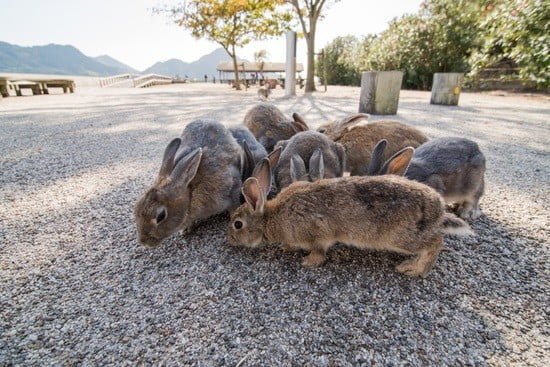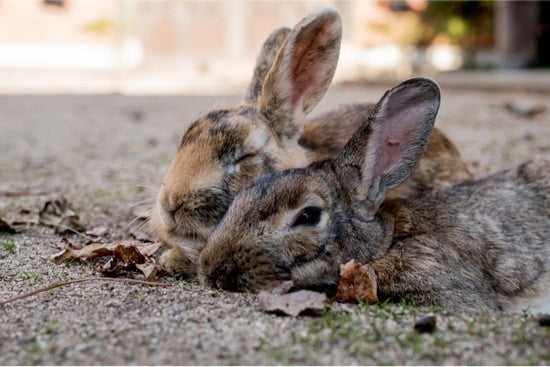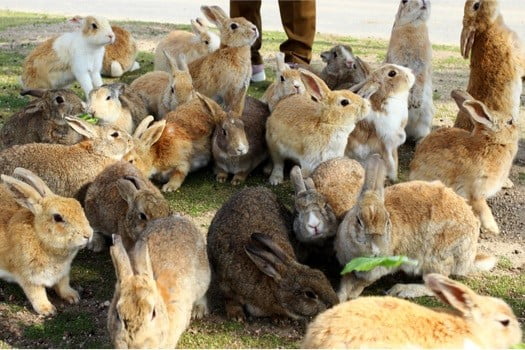At a glance, there appear to be very few differences between wild and domesticated rabbits. If you find a cute wild rabbit outside, it may be tempting to home it with your pet rabbits. Domestic rabbits live longer than their wild equivalents, so it seems like the right thing to do.
Domestic and wild rabbits are incompatible. Pet rabbits are fed and protected from predators, so they lack the instincts to survive in the wild. Wild rabbits, meanwhile, will not cope with being domesticated. Wild rabbits feel trapped in such settings and become frightened.
This is not to say that your pet rabbit will never encounter a wild counterpart. The animals could cross paths if wild rabbits gain access to your yard. You’ll have to monitor this situation carefully. While they may not fight with each other, wild rabbits often carry disease and parasites.
Do Wild and Domesticated Rabbits Get Along?
The two types of animal have wildly different life experiences. Thankfully, the gentle demeanor of all rabbits means the animals will rarely fight.
Note that these two types of rabbits rarely cross paths. Domesticated rabbits will not survive in the wild, and should never be set free. Wild rabbits should never be tamed and confined as it causes severe stress.
Wild and domesticated rabbits share some similarities. This means they’ll find enough common ground to co-exist. These similarities include:
- Both types of rabbit will dig warrens to live in. Rabbits like to climb, but only for recreation. All rabbits would rather live underground than in the trees.
- Both rabbits can survive on a similar diet. Wild rabbits will be less fussy though, eating tree branches and bark if hungry. Domesticated rabbits are more pampered, and used to treats.
- Both rabbits are social and dislike being alone. Any rabbit will seek out the company of their own species.
- Both rabbits understand the importance of hierarchy. All rabbits look to establish a place in the pecking order.
Wild and domestic rabbits also have a range of differences, though. You can tell the difference between the rabbits by sight. It’s essential to do so because these differences may lead to conflict.

Key behavioral differences between these rabbits include:
- Wild rabbits are considerably more nervous than pet rabbits. In the mind of these animals, anybody and everything is a potential predator.
- Wild rabbits will live within an existing colony. A pet rabbit will find it difficult to infiltrate a group. The reaction may be hostile.
- Wild rabbits will have finely-honed survival instincts. A free-roaming rabbit will fight tooth and claw if a threat is perceived.
- Wild rabbits are native to the United States. Any pet rabbit will be a different breed, imported from Europe.
- Wild rabbits are natural foragers, with an innate understanding of how to find food. This means a wild rabbit will guard their food source jealously.
- Wild rabbits have not been spayed or neutered. This means the rabbit will attempt to mate with anything on four legs. This includes your pet. If rejected, a wild rabbit may become antagonistic.
How Would Wild and Domesticated Rabbits Meet?
There are two situations in which domesticated pest would cross paths with wild rabbits.
- Your pet has escaped its hutch, and by extension, your yard. If wild rabbits roam in your area, the two rabbits will meet up.
- Local wild rabbits can gain access to your yard. This may be done by hopping over, or digging under, a fence. If your rabbit is exercising, the two rabbits may cross paths.
If this happens, it’s not the end of the world. The rabbits will likely ignore each other. At best, they may even get along. Whatever the outcome, you’ll need to watch carefully.
Should I Let My Pet Rabbit Play with a Wild Rabbit?
It’s best not to allow your pet to become too attached to a wild rabbit. The relationship could turn sour at short notice. Even if it doesn’t, there is a range of other concerns.
The biggest of these is health. As VCA Hospitals explains, wild rabbits could have a host of infectious diseases. A domestic rabbit’s immunity may not be strong enough to cope with these.
Even if the wild rabbit has a clean bill of health, parasites are a concern. Wild rabbits may be covered with fleas, ticks, or mites. These parasitic bugs can get on your pet, making life miserable.
There is also a potential temperament issue. Most rabbits are docile by nature. A wild rabbit is unlikely to start a fight. Such animals are easily startled, though. Wild rabbits may react in self-defense, and hurt your pet.
Don’t forget that rabbits love to procreate. A wild rabbit will attempt to mate with your pet. To be on the safe side, keep a clear dividing line between the species. Even if they express interest in each other, it’s safer to segregate.
Would a Pet Rabbit Bond with a Wild Rabbit?
It’s possible that a pet rabbit and domestic rabbit would forge a bond. It is unlikely, though – to the point of being virtually impossible.
The animals would need to spend enough time together for this to become a possibility. As established, it’s safer to separate domesticated and wild rabbits quickly.
Bonding rabbits also need to undergo a lengthy communication process. Technically, all lagomorphs speak the same language. There are enough differences between wild and pet rabbits to cause misunderstandings, though.
Even if the two rabbits establish a hierarchy, there is the living issue. Bonded rabbits want to live together. A wild rabbit will never cope with life in a hutch, though. It can lead to fatal stress.
Few rabbits will have the patience to overcome all of these obstacles and bond. Stranger things have happened, but it’s unlikely.

Do Wild and Domesticated Rabbits Breed?
As pet rabbits are from different breeds to wild rabbits, it’s unlikely that they’ll mate. Occasionally this will happen. The Dodo found an example in the UK. Overall, the differences are usually too significant to overcome.
Of course, any responsible pet owner will also spay or neuter their rabbit. This cannot be recommended highly enough. It enhances rabbit health, and minimizes the risk of sickness.
This will not stop a wild rabbit attempting to mount your pet, though. Be mindful of this. There is always the risk of a phantom pregnancy in a domesticated rabbit. It will also cause your pet a great deal of stress.
Can an Injured Wild Rabbit Live with My Pet?
Wild rabbits cannot live in captivity. The rabbit will be afraid of humans, so you won’t be able to handle it. Wild rabbits also grow distressed by the idea of living in a hutch.
Upon discovery of an injured rabbit, you can report it to a rehabilitation center. The Humane Society provides contact details by state. A professional can then aid the rabbit in distress.
If the rabbit is on your property, you may wish to help it yourself. Do not attempt to nurse the rabbit back to health unless you have the experience, though.
If you bring the rabbit into your home, do not house it with your pet. You will not know the extent of their injury, and if the animal is carrying disease. Instead, house the wild rabbit in your bathtub or a large pet carrier.
Call your vet, and ask if the surgery treats wild rabbits. The answer is likely to be no. In such a case, find your closest rehabilitation center.
Would My Pet Rabbit Care for Abandoned Wild Baby Rabbits?
Abandoned nests of baby rabbits are a common site for hikers and walkers in the country. It’s only natural to contemplate bringing these defenseless animals home. Perhaps your pet rabbit will raise them as her own?
This is inadvisable – and unnecessary – for many reasons. Rabbits are not overtly maternal animals. Your pet is more likely to eat the babies than nurture them. Such an action will not be born of confusion, not cruelty.
The nest is also unlikely to be abandoned. After giving birth, a female rabbit does not stay with the nest. She covers it up and returns once a day to feed her young. This sounds like a dereliction of responsibility, but it keeps the babies safe.
Rabbits know that they are a prey species. The mother keeps her distance to keep her young safe. This way, if a predator picks up her scent, she can hope to outrun it. She will guide the predator as far from her nest as possible.
Baby rabbits have no such ability to defend themselves. This means they are best left alone. Disturbing a nest can cause unnecessary hardship for young rabbits and their mother. If in doubt, call a rehabilitation center.
Wild and domesticated rabbits may both be rabbits, but they remain different species. With this in mind, they cannot live together. Their differences are too pronounced.
If your pet interacts with a wild rabbit, it’s not the end of the world. Put a stop to any interaction quickly, though. It will be safer for all the rabbits involved.


I own a wild rabbit. My sisters dog killed its family 🙁 and she brought it to me as we had a house rabbit and she thought we would know what to do. Its eyes weren’t open yet and it had little fur. No animal rehab would take it and advised us to put it back where we found it, as thwy even had little luck bottle feeding them. Warned of aspiration leading to pneumonia, and of bloat. We fed him from a tiny eyedropper, very carefully. Just a drop at a time on his lips till he learned. Later, we collected cecotropes and innoculated his digestive tract. He is 2 years old and a joy! He loves us. Has different behaviors than our domesticated rabbit that moved out with our daughter. He has been raised as a house rabbit. He doesn’t chew on everything like our domesticated one did. He is very trusting, loving and interactive. Wish i could send photos! He was only in a cage when he was a tiny baby because we didn’t want to lose him in the house 🙂
P. S. I think this worked because we were very familiar with our domesticated house rabbit, that lived past 12 years. We honored how she liked things, only picked her up for necessary grooming and vet visits. Free fed her hay predominently, and greens, herbs…not pellets, except as a suppliment “treat” in small amounts. We fed the wild baby powdered goat milk formula made a little extra rich by adding a little more powder to the water, and a tad of heavy cream in it. Until he was old enough for hay, dandelions, herbs and greens. He uses a litter box.
Hey Jennifer, we have a wild rabbit too. Our dog had it in its mouth and we saved it. It’s eyes weren’t even open yet, it felt like it was bonding with me at first when I was bottle feeding it and now it’s just kind of wild and doesn’t like us to really mess with it. It has its own play pen and we let it roam if we are home during the day. Is there any advice you have for us? Ours is only about 2 months old
If his eyes were closed and little fur, he is definitely a type of rabbit, a baby hare or Leveret is born with fur and eyes open. Hares are almost impossible to domesticated and are better off in the wild.
Hi, I have had a wild rabbit since he was really young, and he has grown to be super affectionate towards me, more than my other pet rabbits. He is now a couple of months old. However, I do worry about him getting lonely during the day when I’m away. My pet rabbit just had babies and I was wondering if once one of them is old enough, if I could put them and the wild bunny together? He (the wild bunny) would still be fairly young, and he gets along nicely with our pet duckling. Would this be okay? Or would it be better for him to just be by himself?